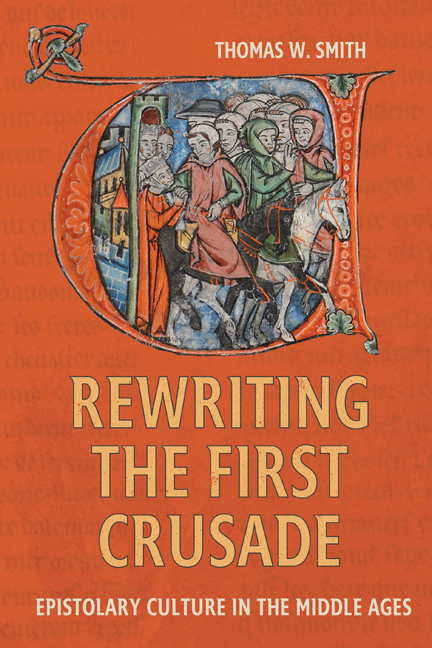Book contents
- Frontmatter
- Dedication
- Contents
- List of Illustrations
- Acknowledgements
- List of Abbreviations
- Introduction
- 1 The Call from the East: The Letters of Alexios I
- 2 The Launch of the Crusade: The Letters of Urban II, 1095–96
- 3 Letters from the Crusader Host, 1097–98
- 4 Letters from the Leaders of the Crusade, 1097–98
- 5 Interpreting the News from the East, 1099–1100
- 6 First Crusade Letters and Medieval Manuscript Cultures
- Conclusion
- Appendix: New Manuscripts of First Crusade Letters
- Bibliography
- Manuscript Index
- General Index
- Crusading in Context
1 - The Call from the East: The Letters of Alexios I
Published online by Cambridge University Press: 09 May 2024
- Frontmatter
- Dedication
- Contents
- List of Illustrations
- Acknowledgements
- List of Abbreviations
- Introduction
- 1 The Call from the East: The Letters of Alexios I
- 2 The Launch of the Crusade: The Letters of Urban II, 1095–96
- 3 Letters from the Crusader Host, 1097–98
- 4 Letters from the Leaders of the Crusade, 1097–98
- 5 Interpreting the News from the East, 1099–1100
- 6 First Crusade Letters and Medieval Manuscript Cultures
- Conclusion
- Appendix: New Manuscripts of First Crusade Letters
- Bibliography
- Manuscript Index
- General Index
- Crusading in Context
Summary
An influential recent strand in the historiography on the First Crusade argues for a geo-political reorientation of its origins from ‘the foothills of Clermont’ to Asia Minor and Constantinople. The Eastern context played an important role in the launch of the crusading movement; it was, after all, probably the call for military assistance that Byzantine envoys presented to Urban II at the Council of Piacenza in March 1095 that sparked the chain reaction which led some 60,000–100,000 men, women and children to take up arms and march to the East. The main plank in this argument is that the emperor of Byzantium, Alexios I Komnenos, wooed the Westerners with personal letters designed to stir up enthusiasm for a military expedition to defend Byzantium in a call from the East. This argument relies on the existence of diplomatic exchanges between East and West, and specifically on three epistles purportedly written by Alexios to high-ranking figures in Europe. While scholars agree that Alexios sent a call for military aid to the pope at Piacenza, the argument that the emperor wrote a personal appeal to Robert I of Flanders and two missives to Abbot Oderisius I of Montecassino rests on shaky foundations. It has been suggested ‘that Alexios knew how to appeal to westerners’ in these documents, and that they struck a chord with Europeans. It is not surprising, however, that the letters transmit a solid grasp of the interests and concerns of the Western clergy, because, I contend, the texts were written by them. Peter Schreiner and Christian Gastgeber have proven this definitively in the case of the letter to Robert I of Flanders, and the present chapter argues that the two letters to the abbot of Montecassino are also Western inventions. Some maintain, however, that the letter to Robert of Flanders is based upon an authentic letter, and Alexios’ two letters to Montecassino are still considered genuine by leading scholars of Byzantine diplomacy as well as historians of the crusades. Given the unresolved tension in the historiography between those who champion the authenticity of these documents and those who proffer more sceptical interpretations, it is necessary to re-engage critically with the Byzantine letters.
- Type
- Chapter
- Information
- Rewriting the First CrusadeEpistolary Culture in the Middle Ages, pp. 11 - 28Publisher: Boydell & BrewerPrint publication year: 2024

